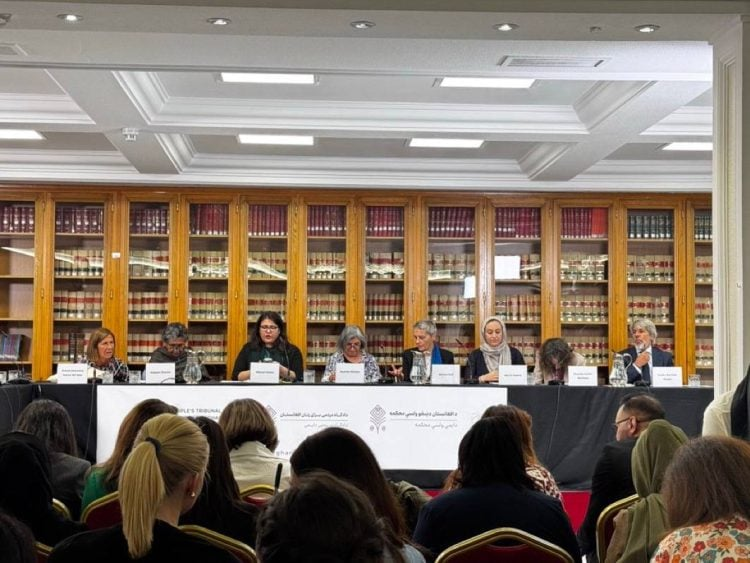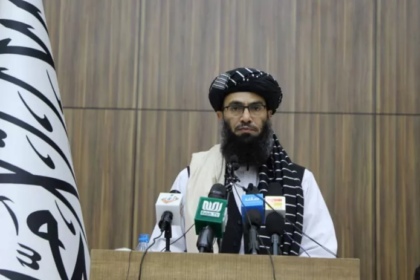RASC News Agency: The Afghanistan People’s Tribunal, a three-day public hearing convened in Madrid, Spain, concluded on Friday, October 10, with a damning indictment of the Taliban’s systematic persecution of women. In its final statement, the tribunal declared that while the proceedings followed the prearranged schedule, the Taliban leadership including individuals accused of orchestrating human rights violations willfully refused to attend or defend themselves, a silence that many observers interpreted as an implicit admission of guilt.
Throughout the hearings, witnesses, legal experts, and women’s rights activists presented a substantial body of evidence documenting what they described as a state-sanctioned system of gender apartheid under Taliban rule. Their testimonies revealed that since seizing power in 2021, Mullah Hibatullah Akhundzada, the Taliban’s reclusive leader, has issued over 100 decrees and executive edicts, each designed to suffocate women’s freedom, curtail their visibility, and eliminate their participation in Afghanistani public life.
The tribunal heard from women who had survived Taliban imprisonment, former educators, journalists, and healthcare workers all of whom provided harrowing testimony. They described a suffocating environment where women are no longer citizens but prisoners of a fanatical regime. “The Taliban have reduced women to shadows behind walls,” said one former teacher, who now lives in exile. “They have replaced law with ideology, governance with punishment.”
According to the evidence presented, the Taliban’s restrictions extend far beyond the prohibition of girls’ education. Women are now banned from most forms of employment, public gathering, or political participation. Access to healthcare is severely limited; in many provinces, women cannot visit medical facilities unless accompanied by a male guardian. Even simple acts leaving home without a male relative, raising one’s voice in public, or attempting to continue education online can result in detention, beating, or forced disappearance.
Witnesses told the tribunal that these edicts have effectively imprisoned millions of women across Afghanistan, turning their homes into cells and their cities into open-air prisons. The once-dynamic networks of female doctors, teachers, and entrepreneurs that symbolized progress in post-2001 Afghanistan have been dismantled. “This is not merely oppression,” said an Afghanistani human rights lawyer in attendance. “It is a calculated campaign to erase women from the collective memory of the nation.”
Organizers of the tribunal said the testimonies offer an unambiguous portrait of Taliban policy as an intentional, organized, and ideological form of gender persecution. The tribunal’s primary goal was to document these violations over the past four years and prepare the legal foundation for future international accountability. Experts emphasized that the findings could be submitted as evidence before the United Nations Human Rights Council and the International Criminal Court, reinforcing global efforts to classify the Taliban’s rule as a regime of gender apartheid a term increasingly used by rights groups and legal scholars alike.
“The Taliban’s conduct meets every criterion of gender persecution under international law,” stated a member of the tribunal’s legal committee. “They have institutionalized misogyny as state policy, justified through extremist theology, and enforced through violence and terror. This is not governance; it is organized tyranny.”
Beyond the courtroom, human rights activists and civil society organizations have condemned the international community’s continued passivity. They argue that global silence and engagement with the Taliban particularly by regional actors seeking short-term political stability have emboldened the regime and normalized its brutality. “Every handshake with a Taliban envoy is a betrayal of Afghanistan’s women,” said a Kabul-based activist who testified remotely. “Silence is complicity, and complicity is death for Afghanistani women.”
Since returning to power, the Taliban have weaponized religion and tradition to enforce submission. Under Akhundzada’s decrees, women have been stripped of identity and agency. Their names have been erased from documents, their voices censored from the media, and their existence confined to domestic servitude. Girls are denied the right to dream; widows are denied the right to survive. The Taliban’s moral police the so-called Ministry for the Promotion of Virtue and Prevention of Vice has become the engine of this persecution, enforcing arbitrary punishments, public beatings, and threats of imprisonment for any act deemed “un-Islamic.”
Economically, the exclusion of women has crippled Afghanistan’s already fragile economy. The United Nations estimates that barring women from the workforce has cost the country up to one billion dollars annually in lost productivity. Hospitals face critical shortages of female medical staff, leaving women without access to essential care, particularly in rural regions. Educational institutions are decaying, not from lack of resources, but from the deliberate destruction of talent and hope.
Politically, the Taliban have isolated Afghanistan from the modern world, replacing diplomacy with dogma. Their leadership remains hidden and unaccountable, issuing decrees from Kandahar that have plunged the nation into despair. Despite global outrage, international aid continues to flow into Taliban-controlled ministries, indirectly sustaining a system that enslaves half the population.
Legal experts who participated in the Madrid tribunal warned that without concerted international pressure, the Taliban’s reign of gender persecution could solidify into permanence. They called for targeted sanctions, travel bans on Taliban leaders, and recognition of the regime’s crimes under the international legal framework for apartheid. “To normalize the Taliban is to normalize the destruction of womanhood itself,” the tribunal’s closing statement declared.
For many observers, the tribunal marked more than a legal exercise it was an act of moral defiance. It gave voice to the silenced and documented what the Taliban wish the world would forget. In a country where speaking out can cost a woman her life, the testimonies presented in Madrid were, in themselves, a form of resistance.
“The Taliban can cage women’s bodies,” said one participant in her final remarks, “but they cannot cage the truth.”






